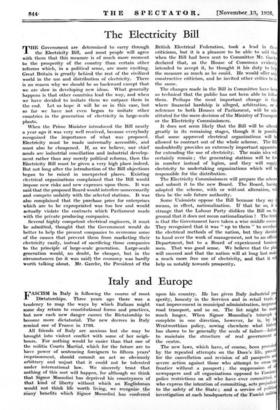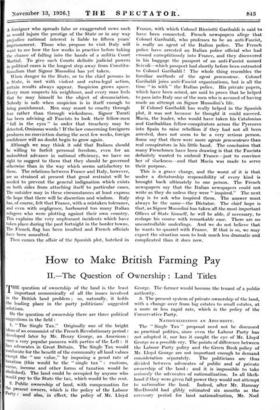Italy and Europe
"FASCISM in Italy is following the course of most -112 Dictatorships. Three years ago there was a tendency to map the ways by which Italians might some day return to constitutional forms and practices, but now each new danger causes the Dictatorship to become more dictatorial. The new decrees in Italy remind one of France in 1793.
All friends of Italy are anxious lest she may be brought into violent conflict with some of her neigh- bours. For nothing would be easier than that one of the militia Courts Martial, which for the future are to have power of sentencing foreigners to fifteen years' imprisonment, should commit an act so obviously arbitrary and unjust that it could not be tolerated under international law. We sincerely trust that nothing of this sort will happen, for although we think that Signor Mussolini has deprived his countrymen of that kind of liberty without which an Englishman would not think life worth living, we recognize the many benefits which SignOt Mussolini has conferred upon his country. Ile has given Italy industrial pry sperity, honesty in the Services and in -retail trade, 1 vast improvement in municipal administration, improved road transport, and so on. The list might be made much longer. When Signor Mussolini's triumph complete in one direction, however, he is, by lid Wentworthian policy, sowing elsewhere what histoe, has shown to be generally the seeds of failure—foilm' to. maintain the structure of real government 31 the centre. The new laws, which have, of course, been prov°1`,ed by the repeated attempts on the Duce's life, Pro'', for the cancellation and revision of all passports and severe action against those who attempt to cross tot. . frontier without a passport ; the suppression of Ad newspapers and all organizations opposed to Fasces' police restrictions on all who -have -ever committed, dl who express the intention of committing, acts Preiudie to the safety of the State ; and a service of investigation at each headquarters of the Fascist militM A foreigner who spreads false or exaggerated news such as would injure the prestige of the State or in any way prejudice national interest is liable to fifteen years' imprisonment. Those who propose to visit Italy will want to see how the law works in practice before taking the chance of falling into the hands of a militia Court Martial. To give such Courts definite judicial powers in political cases is the longest step away from Constitu- tionalism -that Signor Mussolini has yet taken.
When danger to the State, or to the chief persons in a State, is met with violent and extra-legal action, certain - results always appear. Suspicion grows apace. Every man suspects his neighbour, and every man feels that he may himself be the object of - denunciation. Nobody -is safe- when suspicion is in itself enough to bring punishment. Men may resort to cruelty through fear rather than through wickedness. Signor Turati has been advising all Fascists to look their fellow-men " full in the eyes " in order that treachery may be detected. Ominous words ! If the law concerning foreigners produces no- conviction during the next, few weeks, foreign confidence will no doubt begin to grow again.
Although we may think it odd that Italians should be willing to forfeit personal freedom, even for an undoubted advance in national efficiency, we have no right to suggest to them that they should be governed otherwise than in the way which seems satisfactory to them. The relations between France and Italy, however, are so strained at present that great restraint will be needed to prevent the general indignation which exists on both sides from attaching itself to particular cases. The outsider may in these circumstances at least express the hope that there will be discretion and wisdom. Italy has, of course, felt that France, with a mistaken tolerance, and even with negligence, harboured too many Italian refugees who were plotting against their own country. This explains the very unpleasant .incidents which have taken place during the past fortnight in the border towns. The French. flag has been insulted and French officials have been assaulted.
Then comes the affair of the Spanish plot, hatched in France, with which Colonel Ricciotti Garibaldi is said to have been connected. French newspapers allege that Colonel Garibaldi, who professes to be an anti-Fascist, is really an agent of the Italian police. The French police have arrested an Italian police official who had crossed surreptitiously into France, and they discovered in his baggage the passport of an anti-Fascist named Scivoli—which passport had shortly before been entrusted to Colonel Garibaldi ! The whole thing resembles the familiar methods of the agent provocateur. Colonel Garibaldi joins anti-Fascist organizations, but is all the time " in with " the Italian police. His private papers, which have been seized, are said to prove that he helped to pass into. Italy-one of the men who is accused of having made an attempt on Signor Mussolini's life.
If Colonel Garibaldi has really helped in the Spanish plot, it was not because he thought it could succeed. Macia, the leader, who would have taken his Catalonian and Garibaldian fellow-conspirators across the Pyrenees into Spain to raise rebellion if they had not all been arrested, does not seem to be a very serious person. Some say that there were more agents provocateurs than real conspirators in his little band. The conclusion that many Frenchmen have been drawing is that the Fascists definitely wanted - to embroil 'France—just to convince her of slackness—and that Macia was made to serve their purpose.
This is a grave charge, and the worst of it is that under a dictatorship responsibility of every kind is brought back ultimately to one person. The- French newspapers say that the Italian newspapers could not write as they do unless they were " inspired." The next step is to ask who inspired them. The answer must always be the same—the Dictator. The chief hope is that, as Signor Mussolini has taken'all the most important Offices of State himself, he will be able, if necessary, to reshape his course with remarkable ease. There are no uncontrollable underlings. And we do not believe that he wants to quarrel with France. If that is so, we may expect the situation soon to look much less dramatic and complicated than it does now.















































 Previous page
Previous page